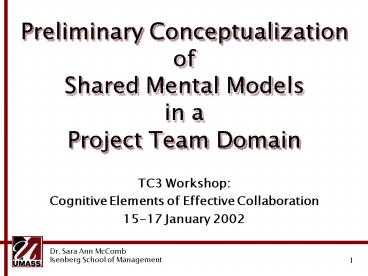Preliminary Conceptualization of Shared Mental Models in a Project Team Domain - PowerPoint PPT Presentation
1 / 31
Title:
Preliminary Conceptualization of Shared Mental Models in a Project Team Domain
Description:
Dr. Sara Ann McComb. Isenberg School of Management. 1. Preliminary Conceptualization ... Dr. Sara Ann McComb. Isenberg School of Management. 6. Shared Mental ... – PowerPoint PPT presentation
Number of Views:165
Avg rating:3.0/5.0
Title: Preliminary Conceptualization of Shared Mental Models in a Project Team Domain
1
Preliminary Conceptualization of Shared Mental
Models in a Project Team Domain
- TC3 Workshop
- Cognitive Elements of Effective Collaboration
- 15-17 January 2002
2
Overview
- Definitions
- Background
- Preliminary Conceptualization
- Contributions
- Future Directions
3
Cross-Functional Project Teams
- A collection of
- two or more individuals,
- representing different functional areas,
assembled to work on - a time-limited, non-repetitive assignment.
- Source Cohen and Bailey, 1997
4
Taskwork vs. Teamwork
- Taskwork
- The functional job behaviors required to
accomplish the assigned task. - Teamwork
- The multitude of processes required to maintain
the team such as cooperation, communication,
interpersonal relationships. - Source McIntyre and Salas, 1995
5
Overview
- Definitions
- Background
- Preliminary Conceptualization
- Contributions
- Future Directions
6
Shared Mental Modelsby Any Other Name . . .
- Cause maps
- Collective mind
- Schemas
- Shared cognition
- Sociocognition
- Team knowledge
7
Background
- Mental models are
- used to describe, explain, and predict
surroundings (Rouse and Morris, 1986) . . . - . . . thereby aiding in the reduction of
uncertainty (Klimoski and Mohammed, 1994) . . . - . . . by running possible scenarios, using
the most salient pieces of information, to
ascertain potential outcomes (Cannon-Bowers,
Salas, and Converse, 1993). - Shared Mental Models are cognitively unified
individual-level mental models held by team
members.
8
Shared Mental Models Defined
- Shared Mental Models
- Knowledge structures held by members of a team
that enable them to form accurate explanations
and expectations for the task, and in turn, to
coordinate their actions and adapt their behavior
to demands of the task and other team members
(Cannon-Bowers, Salas, Converse, 1993, p. 228). - Schemas
- Built-up repertoires of tacit knowledge that are
used to impose structure upon, and impart meaning
to, otherwise ambiguous social and situational
information to facilitate understanding (Gioia,
1986, p. 56). - Interpretive schemes
- . . . shared, fundamental (though often
implicit) assumptions about why events happen as
they do and how people are to act in different
situations (Bartunek, 1984, p. 355).
9
Shared Mental Models
- Mental representations
- based on
- past experiences and inherent knowledge
- that
- aid individuals in determining the best course of
future action.
10
Expected Outcomes
- Better task performance (e.g., Entin and Serfaty,
1999 Walsh, Henderson, and Deighton, 1988) - Better team processes that lead to better task
performance (e.g., Ensley and Pearce, 2001
Mathieu, Heffner, Goodwin, Salas, and
Cannon-Bowers, 2000) - Better motivational outcomes
11
Current Limitations in the Field
- No consensus regarding
- Identification of what should be shared
- Definition of shared
- Measurement of shared mental models
- Effects of shared mental models on team outcomes
- Source Cannon-Bowers and Salas, 2001
12
Overview
- Definitions
- Background
- Preliminary Conceptualization
- Contributions
- Future Directions
13
Preliminary Conceptualization
- Two dimensional framework
- Shared mental models contents
- Information processing phases
14
Shared Mental Models Contents
- Multiple models have been identified (e.g.,
Mathieu, Heffner, Goodwin, Salas, and
Cannon-Bowers, 2000) - Determinants of shared mental models (e.g.,
Kraiger and Wenzel, 1997)
15
Shared Mental Models Contents
- Determinants
- Individual
- Team
- Organization
- Environment
- Models
- Team Membership
- Project (taskwork)
- Interaction (teamwork)
- Climate
- Context
16
Preliminary Conceptualization
- Two dimensional framework
- Shared mental models content
- Information processing phases
17
Information Processing
- Individual level (e.g., Shroeder, Driver, and
Streufert, 1967) - Group level (e.g., Gruenfeld and Hollingshead,
1993 Hinsz, Tindale, and Vollrath, 1997)
18
Information Processing
- Differentiation
- The identification of multiple perspectives
- Integration
- The reconciliation of the various perspectives
into functioning mental representations
19
Preliminary Conceptualization
20
Information Processing
- Differentiation
- The identification of multiple perspectives
- Integration
- The reconciliation of the various perspectives
into functioning mental representations
21
Differentiation As a Transactive Memory System
- Transactive memory is a cooperative memory system
for encoding, storing, and retrieving information
(Wegner, 1987, 1995). - Transactive memory research has typically
examined information about expertise. - Each shared mental model will require its own
transactive memory directory.
22
Information Processing
- Differentiation
- The identification of multiple perspectives
- Integration
- The reconciliation of the various perspectives
into functioning mental representations
23
Integration
- High levels of integration can limit the scope of
the information considered by a team (e.g.,
Corner, Kinicki, and Keats, 1994) - Integration levels
- are dependent upon shared mental model content
- determine the requisite sharing level
24
Sharing
- To have in common
- To divide
- Sources Cooke, Salas, Cannon-Bowers, and
Stout, 2000 Klimoski and Mohammed, 1994
Mohammed and Dunnville, 2001
25
Integration and Sharing
26
Shared Mental Models Corresponding Sharing
Levels
- Models
- Team Membership
- Project (goals)
- Project (work content)
- Interaction
- Climate
- Context
- Sharing Level
- Compatible
- Identical
- Distributed
- Overlapping
- Overlapping
- Overlapping
27
Preliminary ConceptualizationSample
Operationalizations
28
Overview
- Definitions
- Background
- Preliminary Conceptualization
- Contributions
- Future Directions
29
Contributions
- Practitioners
- Guidance for team development
- Academicians
- Framework for use in future empirical work
30
Overview
- Definitions
- Background
- Preliminary Conceptualization
- Contributions
- Future Directions
31
Future Directions
- Conceptualization Finalization and Field
Validation - Measurement Instrument Development and Validation
- Application Development
- Exercises for Virtual Teams
- Diagnostic Tools for Teams
- Tests of Impact on Team Performance































